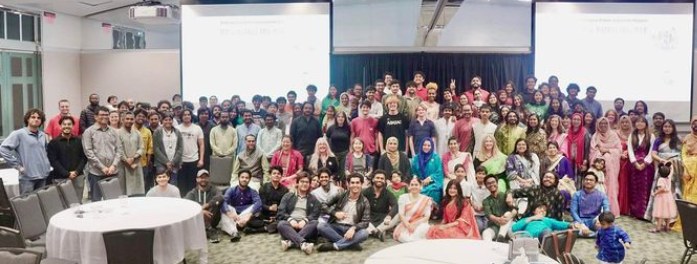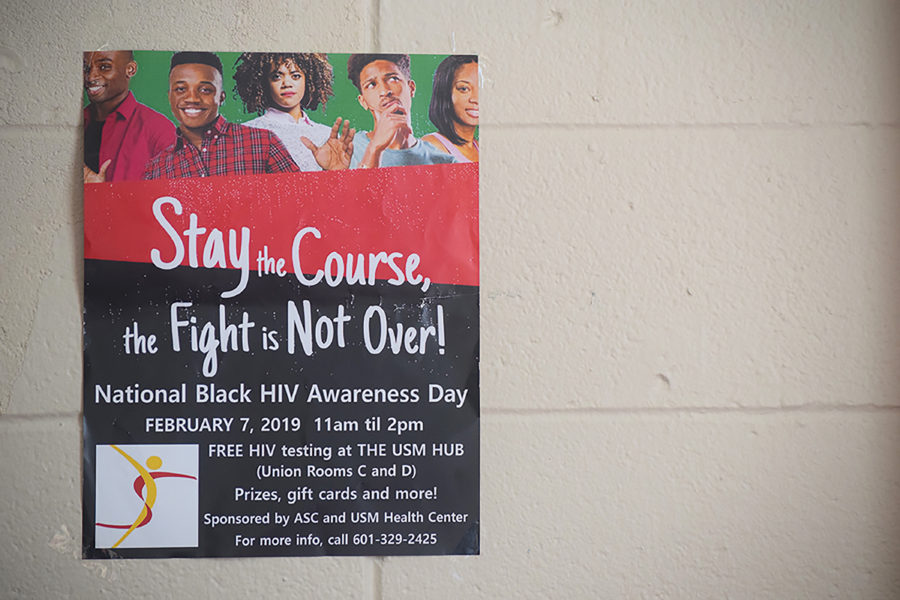The Moffitt Health Center and AIDS Services Coalition of Hattiesburg will offer free HIV testing in honor of National Black HIV Awareness Day on Feb. 7 from 11 a.m. to 2 p.m. in the Hub.
The human immunodeficiency virus (HIV) is usually spread through sexual contact. Once someone contracts the virus, they have it for life. However, early diagnosis and proper medical care can prolong the lives of those infected.
According to the Centers for Disease Control and Prevention, African Americans consistently have the highest rates of HIV when compared to other ethnic groups.
HIV testing coordinator for the ASC Natasha Thomas said the goal is to persuade African Americans, especially males, to get tested during the health fair.
African Americans accounted for 341 HIV diagnoses of 428 in 2017, according to the Mississippi State Department of Health. Between 2013 and 2017, African American males accounted for most of the diagnoses with differences between the sexes up to 237.
“A lot of those cases are from rural areas,” Thomas said. “They don’t have a lot of doctors. If you’re a young black gay male, that’s another thing. That’s another stigma. A lot of people just don’t feel comfortable with knowing they’re young, black and gay and going out to the doctors openly.”
With gift cards as incentives, Thomas said students can expect to be pricked in the finger of their dominant hand and receive their test results in 20 minutes. Students will receive their results privately.
Thomas acknowledged the stigma surrounding sexual health that tends to hinder people from getting tested.
“We’re trying to make sexual health a general conversation,” Thomas said. “We know that people are having sex, and we want to provide them with the services on how to protect themselves at all times,” Thomas said.
Health educator and promotions coordinator for the Moffitt Health Center Kayla Johnson said students have “so many outlets for education now that they are literally at our fingertips.”
“I also believe that you can give a person all the information in the world, but at the end of the day, it is up to the individual to make the choice to use protection, practice other safe sex tips or abstain from sex altogether,” Johnson said. “Overcoming the myth that ‘it won’t happen to me’ is part of the battle. Until people acknowledge that fact that one in two sexually active young people will get an STD before the age of 25, and most of them will not know it and make a valid effort to protect themselves, education can only be effective if the person is willing to put knowledge into action.”
Thomas attributed high STI rates and misinformation about sexual health to poor sex education in Mississippi, specifically the abstinence-only or abstinence-plus policy for public schools, which prohibits teaching abortion and proper condom use.
Field organizer at Planned Parenthood Tyler Harden experienced this way of teaching during her secondary education in Lamar County.
“I remember in seventh or eighth grade that they would give people certificates if they promised to be abstinent,” Harden said. “I remember people going to the Powerhouse at USM for presentations to get money. Once they got there, the presenters would dazzle them and tell them this whole presentation is about being abstinent and saving yourself for marriage and then give them a gift certificate for a certain amount of money. I want to say it was $25 or $30 just for saying they would be abstinent.”
Harden said she also remembers a “shameful” tape exercise, where a piece of tape would be stuck to someone’s arm and passed around to everyone else to demonstrate how “unclean” a person would be by having sex with multiple people.
As a young adult, Harden said she learned most of her information about sex and emergency contraceptives from the Planned Parenthood website.
Harden said talking about sex with her parents in her adolescence made her parents uncomfortable.
“I think that a lot of black people think that if you mention sex, you give kids permission to explore sex,” Harden said. “It’s something that you’re going to explore eventually, so why not give people the tools to do it safely?”
Harden said she was inspired to work at Planned Parenthood because she was interested in the connection between black people and health after learning her grandmother died shortly after childbirth and her grandfather contracted HIV in the 80s.
After visiting Planned Parenthood for information about birth control during her time as an undergraduate, she said she finally felt “heard, listened to and seen” for the first time.
Harden said she would advise black students to “find providers and teachers who don’t look at you as something that needs to be saved but as someone who already has the autonomy to make your own decisions.”
Students can receive free HIV testing at the Moffitt Health Center or the ASC now. For more information about the ASC, visit ascms.net






























